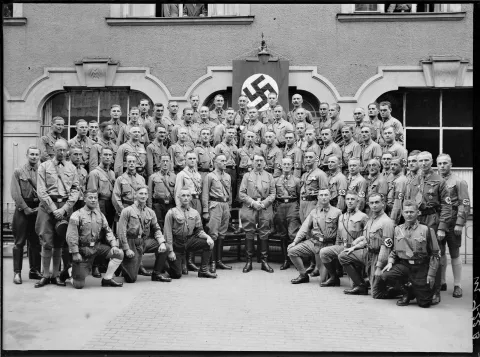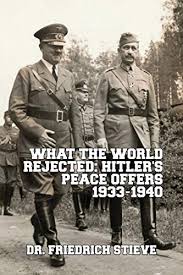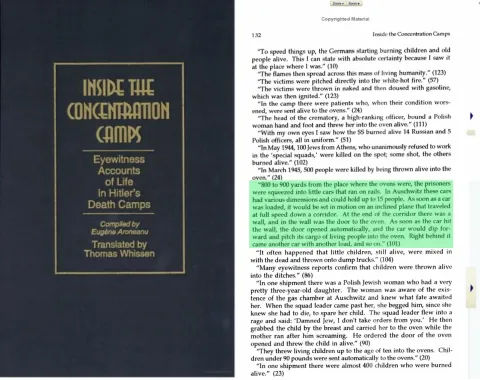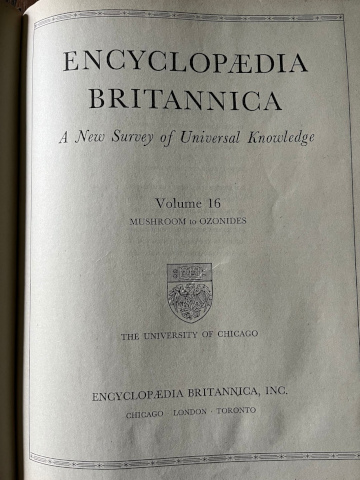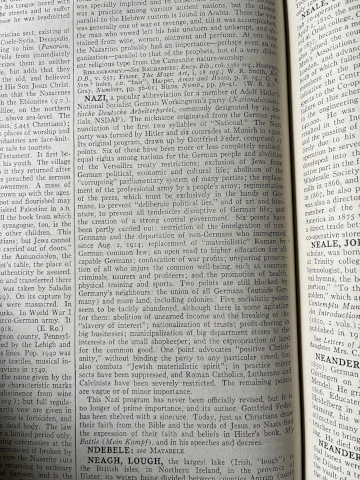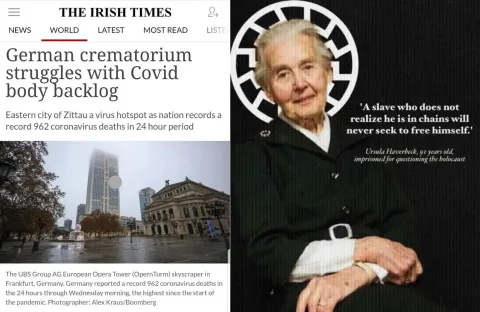Hitler Youth in Color
Hitler the Motivator
Hitler Speaks in Eberswalde, Germany, July 27th, 1932
Wherever we go in Germany today, it's the same image of an uprising of our people, an uprising that shows that millions of people today are aware that in the coming election there is more at stake than usual, that we are not deciding on some new coalition, not even on a new government, but rather we are deciding on victory or defeat of two directions in Germany...
Life in the Third Reich and The World Political Situation Then and Now
Life in the Third Reich and The World Political Situation Then and Now.
A speech by Friedrich Kurreck. English translation by Eric Thomson.
I am happy to inform you about our life in Hitler's time, for today's politicians and mass media are purposefully untruthful about that time. I am a Thüringer who grew up in a farming family with seven children, and I have vividly experienced Hitler's time. My profession is that of certified engineer, for which I began my studies in Thüringen. I had a scholarship, since my mother could not provide money for tuition after my father was killed by lightning. Under National Socialism, it was no problem for a member of a numerous family to obtain a scholarship plus living expenses. One had merely to fill out an application.
As the English, with genocide intent, began bombing German cities' populations of civilian men, women, children and elderly, I volunteered for the Air Force to become a pilot in order to shoot down the English terror bombers. In the course of the war, I served as pilot in a fighter squadron. After my imprisonment, I returned to my home in Thüringen, but I had to flee to West Germany, because my friends and others were being grabbed by the Communist criminals, never to return.
I completed my studies in West Germany, while earning my own living expenses. After six years of professional activities, I secured a position as chief engineer in a large West German industrial enterprise. I later founded my own development firm whose many inventions and developments enabled me to create many jobs for Germans.
Today's decline in nearly every area of German society stems from the continual failures of the postwar political system and its politicians. Postwar West Germany was rebuilt by us, the young, former soldiers who returned from imprisonment, along with the men and women of our homeland. There were also many old and fit business managers who had, during the war, managed to increase war production under the hail of English and American bombs. All of us wanted to rebuild our Germany in the spirit of German unity. The BRD (Federal Republic of Germany) was presented to us as provisional, until the re-establishment of Germany. Today, the established politicians of all stripes tacitly take this provisional, unconstitutional BRD as permanent. No established politician of today has ever acknowledged this unacceptable situation for the future. The German Reich still has its legitimate existence. It is just not functioning! The fate of our politicians whom we elected in 1933 is generally known; the Nuremberg Judgements were blatant injustice!
Encyclopaedia Britannica on Nazis, 1947
The following is the full text of the article for Nazi from Volume 16 of the 1947 edition of the Encyclopaedia Britannica. Note that there is not one word of a Holocaust, a genocide of Jews, or any of the other countless slanders heard today. Included below are images of the original pages, click on each to enlarge.
NAZI, a popular abbreviation for a member of Adolf Hitler’s National Socialist German Workingmen’s party (Nationalsozialistische Deutsche Arbeitpartei, commonly designated by its initials, NSDAP). The nickname originated from the German pronunciation of the first two syllables of “National.” The Nazi party was formed by Hitler and six comrades at Munich in 1920. Its original program, drawn up by Gottfried Feder, comprised 25 points. Six of these have been more or less completely realized: equal rights among nations for the German people and abolition of the Versailles treaty restrictions; exclusion of Jews from German political, economic and cultural life; abolition of the “corrupting” parliamentary system of many parties; the replacement of the professional army by a people’s army; regimentation of the press, which must be exclusively in the hands of Germans, to prevent “deliberate political lies,” and of art and literature, to prevent all tendencies disruptive of German life; and the creation of a strong central government. Six points have been partly carried out: restriction of the immigration of non-Germans who immigrated since Aug. 2, 1914; replacement of “materialistic” Roman by German common law; an open road to higher education for all capable Germans; confiscation of war profits; unsparing prosecution of all who injure the common well-being, such as common criminals, usurers and profiteers; and the promotion of health, physical training and sports. Two points are still blocked by Germany’s neighbours: the union of all Germans (outside Germany) and more land, including colonies. Five socialistic points seem to be tacitly abandoned, although there is some agitation for them: abolition of unearned income and the breaking of “slavery interest”; nationalization of trusts; profit-sharing in big business; municipalization of big department stores in the interests of the small shopkeeper; and the expropriation of land for the common good. One point advocates “positive Christianity,” without binding the party to any particular creed, but also combats “Jewish materialistic spirit”; in practice minor sects have been suppressed, and Roman Catholics, Lutherans and Calvinists have been severely restricted. The remaining points are vague or of minor importance.
This Nazi program has never been officially revised, but it is no longer of prime importance, and its author, Gottfried Feder, has been shelved with a sinecure. Today, just as Christians draw their faith from the Bible and the words of Jesus, so Nazis find the expression of their faith and beliefs in Hitler’s book, My Battle (Mein Kampf), and in his speeches and decrees.
Hauntingly Prophetic National Socialist German Leaflets
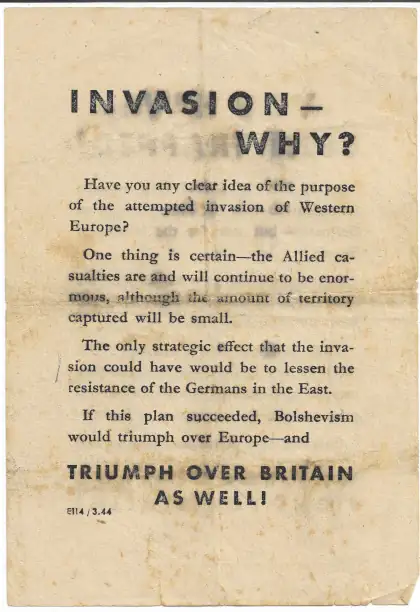 Evidently published in March of 1944 and dropped out of planes over military and population centers in Britain, these leaflets contain warnings to Allied soldiers informing them that they were actually risking their lives on behalf of Communism and Bolshevism, which would consume the world if they were victorious. Looking at the world today, we should humbly admit that Htiler was right!
Evidently published in March of 1944 and dropped out of planes over military and population centers in Britain, these leaflets contain warnings to Allied soldiers informing them that they were actually risking their lives on behalf of Communism and Bolshevism, which would consume the world if they were victorious. Looking at the world today, we should humbly admit that Htiler was right!
Click here for the full article, text and images.
Tales from the Holohoax: Nazi Gas Trains
Published on Feb 12, 2014 at http://www.youtube.com/watch?v=VTK6DL5rjNA
German-born Jew Kurt Messerschmidt describes how he learnt the Germans were gassing people in trains in Poland as early as 1939.
The Devil has Released the Details
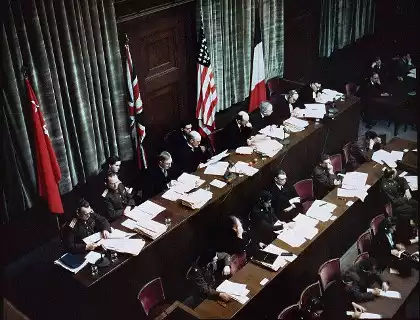 While we won't have time to review 250,000 pages any time soon, or perhaps even in this lifetime, Stanford Libraries has now published the archives from the Nuremberg trials at the Taube Archive of the International Military Tribunal (IMT) at Nuremberg (1945-1946).
While we won't have time to review 250,000 pages any time soon, or perhaps even in this lifetime, Stanford Libraries has now published the archives from the Nuremberg trials at the Taube Archive of the International Military Tribunal (IMT) at Nuremberg (1945-1946).
From the main page:
Description of Collection: The collection in the Virtual Tribunal platform contains approximately 250,000 pages of digitized paper documents (transcripts of the hearings in English, French, German and Russian; written pleadings; evidence exhibits filed by the prosecution and the defense; documents of the Committee for the Investigation and Prosecution of Major War Criminals; the judgment).
Of course, we do not expect any great revelations of truth to come from any of this. But sooner or later, "the hail shall sweep away the refuge of lies".
Whoever Shakes a Jew's Hand...
Postcard from 1938."Whoever shakes a Jew’s hand, betrays his People and the Fatherland"
The apostle John had warned about that same thing: "9 Each who going forth and not abiding in the teaching of Christ has not God. He abiding in the teaching, he also has the Father and the Son. 10 If one comes to you and does not bear this teaching, do not receive him into the house and do not speak to welcome him! 11 For he speaking to welcome him takes a share in his evil works." - 2 John 9-11
Footage from Westerbork Concentration Camp
Plenty of time for sports, entertainment, and a little honest work. The inmates in Germany's Westerbork Concentration Camp had a much better quality of life than those in U.S. prisons today, and a much better chance of survival.
Adolf Hitler: The Greatest Story Never Told
The Greatest Story Never Told is in our opinion the best biographical documentary on Adolf Hitler ever produced.
When Dennis Wise first created it, he sold DVD copies at his own website, however they have not been available for several years and the movie has been banned from all popular Social Media platforms on multiple occasions.
So for the last few years we hosted several copies of this video at Christogenea because to Dennis, it was more important to keep the video available than it was to worry about money.
However now the video is available on DVD once again, and our friend Dennis Wise needs our support. Please consider purchasing a copy of this video in a four-disc boxed set from Money Tree Publishing.
Record of the U.S. Congress regarding the Katyn Forest Massacre
Record of the U.S. Congress regarding the Katyn Forest Massacre
From the Congressional Record of the Congress of the United States: The Katyn Committee Report recorded on July 2nd, 1952 but not released to the general public until August of 2001. The official name of the committee was the United States House Select Committee to Conduct an Investigation of the Facts, Evidence, and Circumstances of the Katyn Forest Massacre (Wikipedia).
While this is not news by any means, there is still propaganda on the internet and in some old history books attributing the Katyn Forest Massacre to National Socialist Germany, or leaving the question open for debate. This report consists of three speakers, all of them members of Congress and of the Katyn committee. The first and third speakers, Rep. Ray Madden of Indiana and Rep. Timothy Sheehan of Illinois, seem to have been rather balanced and unbiased, remaining focused sufficiently on Katyn and the implications of concealing knowledge of Katyn which would be suffered in various aspects. We found Sheehan’s testimony concerning all the missing documents during and after the War quite interesting. When history disappears, it is easier to rewrite. The second speaker, Rep. Tadeusz Machrowicz of Michigan, who was evidently an ethnic Pole, had to take time to slander the “Nazis” in relation to other, unnamed atrocities supposedly proven at Nuremberg. At one point in his career as a Congressman, Machrowicz was lauded by the Jewish Telegraph Agency for having submitted a bill for “Aid to victims of Nazis”, even if they were not American citizens during the war. – William Finck
Hans Schmidt - Living in Hitler's Germany
From the WVradioman channel on Bitchute:
This is a wonderfully written document that appeared in a monthly newsletter written by the late Hans Schmidt, which was called "GANPAC" (German-American National Political Action Committee), and describes a view-point of Germany's National Socialism, as seen through the eyes of a German of a person who lived, worked and fought for his country, during the days of Germany's re-birth / renaissance.
We need to also remember., that the "Western point-of-view" of National Socialist Germany has been generated from a Jewish view-point, and that what we have seen of Germany (via the Jewish owned / controlled "main stream media") is through the eyes of Jews who hated National Socialism (for cutting them off from their parasitic, corruptive AND profiteering ways), and wanted to completely overthrow the German people, so they could again, control AND profit from the German people once more!!
The Life and Times of Corneliu Zelea Codreanu
This video was originally posted on Youtube and appears here courtesy of Cultured-Thug.
Romanian politician Corneliu Zelea Codreanu was in 1923 the co-founder of a party called the National-Christian Defense League, a Christian nationalist organization, and later in 1927 founder and leader of a party called the Iron Guard. While he errantly believed that he himself was chosen by God to save Romania from the hands of the devil, he was certainly ahead of his time when he said that "A country has the Jews if deserves. Just as mosquitoes can thrive and settle only in swamps, likewise the former can only thrive in the swamps of our sins."
This is absolutely true. The modern Jews, who are the children of those who created ancient wonders such as Sodom and Gomorrah, are the world's oldest panderers. But they can only thrive when the societies which they infiltrate accept their sins, and are willing to join in them for themselves.
Finally achieving success in the elections of 1937, his rise to power was obstructed by the moderate Romanian King Carol II, upon which Codreanu was imprisoned and unlawfully assassinated by Romanian military police.
![]() A PDF copy of an English translation of Codreanu's book, "For My Legionaries", as well as another video, Who is Corneliu Codreanu?, has been posted here since early 2010.
A PDF copy of an English translation of Codreanu's book, "For My Legionaries", as well as another video, Who is Corneliu Codreanu?, has been posted here since early 2010.

